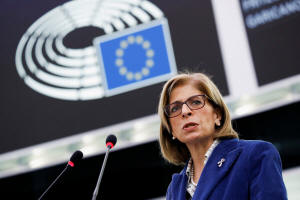EU to aggregate cancer imaging data across bloc in new project
 Send a link to a friend
Send a link to a friend
 [January 24, 2023]
By Maggie Fick and Ludwig Burger [January 24, 2023]
By Maggie Fick and Ludwig Burger
(Reuters) -The European Union on Monday launched a project to collect
and aggregate cancer imaging data in an effort to speed up innovation
and early cancer diagnosis using artificial intelligence.
The new European Cancer Imaging Initiative will give clinicians,
researchers and innovators "easy access to large amounts of cancer
imaging data", the European Commission said in a statement.
"A cross-border, interoperable, and secure infrastructure that will
preserve privacy will speed up innovation in medical research. For
example, it will be possible to train new technologies that use
artificial intelligence (AI) on a large dataset."
The project is in line with the EU's data strategy and is compliant with
the EU's data protection legislation, known as GDPR, according to the
statement.
EU Health Commissioner Stella Kyriakides said in a speech for the launch
that digital technology is changing the understanding of how cancer
develops. The new data project links with existing EU efforts to extend
routine screening for breast, cervical and colorectal cancer to 90% of
eligible Europeans.

[to top of second column]
|

European Commissioner for Health and
Food Safety Stella Kyriakides delivers a speech on the EU's Role in
Combatting the coronavirus disease (COVID-19) Pandemic and How to
Vaccinate the World, at the European Parliament in Strasbourg,
France, November 24, 2021. Julien Warnand/Pool via REUTERS
 European companies that are working
on artificial intelligence systems to help diagnose and treat cancer
include medical scanner makers Philips and Siemens Healthineers, as
well as X-ray contrast media maker Bayer. To strengthen those
efforts, Bayer last week agreed to acquire Blackford Analysis Ltd.,
a British developer of AI to help diagnose disease from medical
images.
When contacted by Reuters, Philips and Healthineers cheered the
initiative, saying that large amounts of data would be instrumental
in creating and validating new diagnostic tools.
"We strongly support the ambition to accelerate the development of
algorithms by creating larger data lakes of critical medical
images," said Germany's Healthineers.
"It offers us a safe and secure platform to get access to health
data in oncology," said Rob Smeets, Director for Innovation and
Strategy in the Chief Technology Office at Philips.
(Reporting by Maggie Fick and Ludwig Burger; Editing by Sharon
Singleton and Frank Jack Daniel)
[© 2023 Thomson Reuters. All rights
reserved.]This material may not be published,
broadcast, rewritten or redistributed.
Thompson Reuters is solely responsible for this content. |